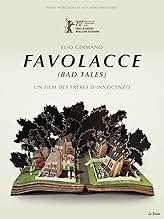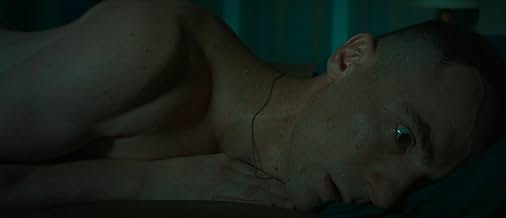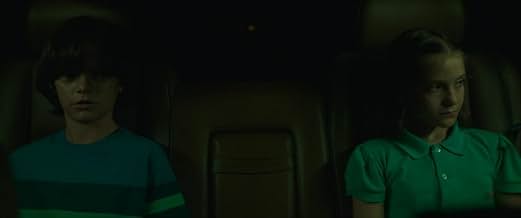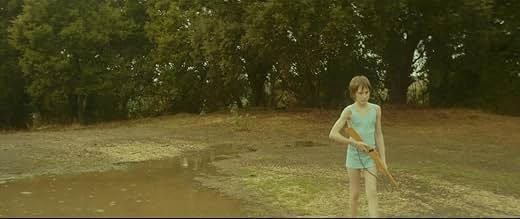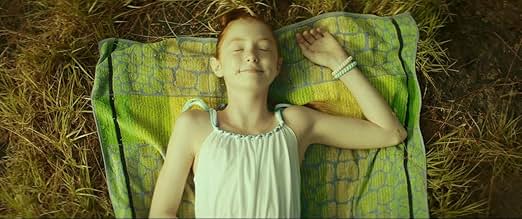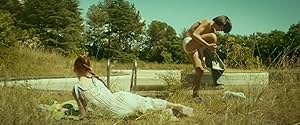Favolacce
- 2020
- 1 घं 38 मि
IMDb रेटिंग
6.4/10
7.3 हज़ार
आपकी रेटिंग
अपनी भाषा में प्लॉट जोड़ेंA few families living out on a limb in the suburbs of Rome. Tensions here can explode at any time; ultimately it's the children who bring about the collapse.A few families living out on a limb in the suburbs of Rome. Tensions here can explode at any time; ultimately it's the children who bring about the collapse.A few families living out on a limb in the suburbs of Rome. Tensions here can explode at any time; ultimately it's the children who bring about the collapse.
- निर्देशक
- लेखक
- स्टार
- पुरस्कार
- 22 जीत और कुल 28 नामांकन
फ़ीचर्ड समीक्षाएं
This movie stages action in a domestic and familiar environment, where violence never explodes, because violence is not a disturbance of that social order, but a pillar: it's behind every gesture, every word, every thought, it's something sinister always lurking inside the grownups (in a minor but important scene, during a birthday party the adults say horrible words towards a mother - but in whispers, like if they were haunted).
Parents shows and expose their kids as trophies, not caring for them but for themselves: in another scene a young father is pleased by the driving skills of his own son and proudly screams "You are like me!" - something that the kid is obviously not willing to be. Generations basically ignore each other's feeling: and ignorance is the trigger of silence, silence is the trigger of despair, and despair the trigger of violence.
Thanks to silence, conflict is invisible, and for this reason it becomes eventually inescapable: and the surprising epilogue is the only moment when peace is restored in the families, as the parents for the first time looks like they are actually caring for their children. We hear from the narrator at the beginning that everything in this story is at the same time true and false: and eventually we understand that this mix creates a scaring thing, called reality. This movie is good cinema and great advice, you should see it.
Parents shows and expose their kids as trophies, not caring for them but for themselves: in another scene a young father is pleased by the driving skills of his own son and proudly screams "You are like me!" - something that the kid is obviously not willing to be. Generations basically ignore each other's feeling: and ignorance is the trigger of silence, silence is the trigger of despair, and despair the trigger of violence.
Thanks to silence, conflict is invisible, and for this reason it becomes eventually inescapable: and the surprising epilogue is the only moment when peace is restored in the families, as the parents for the first time looks like they are actually caring for their children. We hear from the narrator at the beginning that everything in this story is at the same time true and false: and eventually we understand that this mix creates a scaring thing, called reality. This movie is good cinema and great advice, you should see it.
It's hard to review such a title: talking about the plot might give away too much or be misleading. I'll just write my observations on the final product: not very useful for those who have to decide whether to watch it or not but well... that's it.
Despite the initial word joke about the source material, I found the story quite inspired - whether it is supposed to be true, made up, a mix, a fairy tale or whatever hermeneutical meta-perspective we are supposed to adopt. Inspired, as was the previous (and first full length) film written and directed by the D'Innocenzo brothers: "La terra dell'abbastanza". Unfortunately I found here the same problems I found there: the overall result is uneven, disjointed, a little inconsistent and often cold.
By cold, I don't mean that it lets the viewer feel the unbridgeable divide between these kids/adolescents and their parents: that divide emerges as an overall unwillingness of adults to understand (or even listen) to kids. By cold I mean that while I wasn't bored wacthing the film, I didn't care either about most of what happened to most of the characters: alienating. Among other things this is mainly due to scenes too stylized/simplistic and to the acting from the kids which - with few exceptions - is not good enough.
At times surgical in a too detached way and others indulging in irrelevant details that just stress the same buttons or feel gratuitously obscure. Finally - and in this worse than "La terra dell'abbastanza" - "Favolacce" feels sometimes inconsistent even for those willing to spend time trying to decipher the code:
Or the questions ARE the story, and we're just tricked with opaque symbols and vague happenings into believing that there's more (and in this "La terra dell'abbastanza" fared better given its plain Noir status). I don't feel like attempting to reach the "hermetic intellectual heights" of any author: for sure I won't make an exception in this case.
Still some scenes and characters magnetize the viewers' attention and alone deserve to be watched (thanks to both the direction, supporting actors like the very good Ileana D'Ambra and Barbara Chichiarelli and/or the writing).
Surely I won't miss D'Innocenzos' next work: yet - and I'm really unsure which one - I would suggest to the authors to work together with a better screenplayer, a better director or both.
Despite the initial word joke about the source material, I found the story quite inspired - whether it is supposed to be true, made up, a mix, a fairy tale or whatever hermeneutical meta-perspective we are supposed to adopt. Inspired, as was the previous (and first full length) film written and directed by the D'Innocenzo brothers: "La terra dell'abbastanza". Unfortunately I found here the same problems I found there: the overall result is uneven, disjointed, a little inconsistent and often cold.
By cold, I don't mean that it lets the viewer feel the unbridgeable divide between these kids/adolescents and their parents: that divide emerges as an overall unwillingness of adults to understand (or even listen) to kids. By cold I mean that while I wasn't bored wacthing the film, I didn't care either about most of what happened to most of the characters: alienating. Among other things this is mainly due to scenes too stylized/simplistic and to the acting from the kids which - with few exceptions - is not good enough.
At times surgical in a too detached way and others indulging in irrelevant details that just stress the same buttons or feel gratuitously obscure. Finally - and in this worse than "La terra dell'abbastanza" - "Favolacce" feels sometimes inconsistent even for those willing to spend time trying to decipher the code:
- who is this narrator that talks like columnists (and screenplayers..) write, finds quite an intellectual's hobby, but has the most unrefined and boorish accent of the film?
- are we supposed to (re-)read "the Canterville Ghost" to LOVE the movie?
- are we supposed to listen again and again to the badly pronounced/registered dialogues to not miss what's said?.
- are we supposed to give our own answers to these and all the other questions that arise watching this "fable"?
Or the questions ARE the story, and we're just tricked with opaque symbols and vague happenings into believing that there's more (and in this "La terra dell'abbastanza" fared better given its plain Noir status). I don't feel like attempting to reach the "hermetic intellectual heights" of any author: for sure I won't make an exception in this case.
Still some scenes and characters magnetize the viewers' attention and alone deserve to be watched (thanks to both the direction, supporting actors like the very good Ileana D'Ambra and Barbara Chichiarelli and/or the writing).
Surely I won't miss D'Innocenzos' next work: yet - and I'm really unsure which one - I would suggest to the authors to work together with a better screenplayer, a better director or both.
It's a good movie. Plot is well worked but they didn't really make the best of it. Dialogues are solid. All together it's a good movie but not as good as it could've been.
Co-directed by brothers Damiano and Fabio D'Innocenzo "Bad Tales" is a dark, downbeat and really rather unpleasant film seriously lacking in the 'feelgood' factor. It's also rather good in a horrible, queasy kind of way; a film to admire for the obvious skill the filmmakers demonstrate but certainly not a film to like. Set during one summer in a suburb ouside Rome it looks, somewhat forensically, at a couple of very dysfunctional families much in the style of Yorgos Lanthimos. The brothers never quite reach the heights that Lanthimos does but we are definitely in the same perverse ballpark.
Both adults and children are treated with the same off-hand cruelty while their actions are never really explained. There's something almost surreal going on here and not in a good way but then the film is called "Bad Tales" so don't say you weren't warned. I doubt if I'll be returning to it anytime soon but while the brothers may not be the Coens I will certainly be interested to see what they do in the future.
Both adults and children are treated with the same off-hand cruelty while their actions are never really explained. There's something almost surreal going on here and not in a good way but then the film is called "Bad Tales" so don't say you weren't warned. I doubt if I'll be returning to it anytime soon but while the brothers may not be the Coens I will certainly be interested to see what they do in the future.
In an atmosphere shrouded in the gray banality of the Roman outskirts, "Favolacce" by the D'Innocenzo Brothers offers a raw and uncompromising look into the lives of some families grappling with their own frustrations and contradictions. It's not a masterpiece, but rather a film that manages to capture some peculiarities of the human condition with a certain degree of effectiveness. The portrayal of family dynamics, laden with tensions made palpable by tight dialogues and direction unafraid to explore the darkest corners of the human psyche, is one of the film's most intriguing elements. Despite their evident dysfunctionality, the characters manage to evoke a certain empathy in the viewer, thanks also to the strong performances of the cast. However, "Favolacce" is not without its flaws. The narrative, while incisive and direct, risks at times to be too raw and lacking in nuances, leaving little room for the complexity of the characters and their relationships. Some scenes, moreover, might come off as overly verbose or repetitive, diluting the emotional impact of the situations depicted. Nevertheless, the film still manages to keep the viewer engaged until the end, thanks also to its ability to provoke reflections and debates on universal themes such as love, family, and the very meaning of human existence. While not a perfect work, "Favolacce" stands out for its audacity and frankness in depicting the brutality of everyday life, without seeking easy consolations or pre-packaged solutions."Favolacce" proves to be a good film, with its peculiarities and its flaws. Despite not reaching peaks of excellence, it still manages to offer an interesting and provocative look into human nature, inviting the viewer to reflect on their own choices and relationships. A must-see for those in search of an intense and stimulating cinematic experience.
क्या आपको पता है
टॉप पसंद
रेटिंग देने के लिए साइन-इन करें और वैयक्तिकृत सुझावों के लिए वॉचलिस्ट करें
- How long is Bad Tales?Alexa द्वारा संचालित
विवरण
बॉक्स ऑफ़िस
- बजट
- €20,00,000(अनुमानित)
- दुनिया भर में सकल
- $2,08,419
इस पेज में योगदान दें
किसी बदलाव का सुझाव दें या अनुपलब्ध कॉन्टेंट जोड़ें


![Trailer [OV] देखें](https://m.media-amazon.com/images/M/MV5BZDVkZjQxODYtZjllYi00ZTU4LWEyZTctN2Q5YWYwZDljNjA0XkEyXkFqcGdeQXRyYW5zY29kZS13b3JrZmxvdw@@._V1_QL75_UX500_CR0)


